La Caldereta pays tribute to La Recova
The Neighborhood Association of La Caldereta-Valle de La Luna de Breña Alta stands out annually for its creativity in recreating traditional scenes at the La Cruz Festival. On this occasion, the focus is on La Recova in Santa Cruz de La Palma, with a representation that includes boxes full of colorful fruits and vegetables, lush flowers and plants, baskets of bread, an impressive image of the market façade and even two mayos on a stand, forming a striking and fresh scene that invites contemplation. In addition, as is customary, an information panel has been provided that offers historical data about the recreation, including a document from 1876 that details the regulations for the operation of the Market Square, along with old and current photographs.
The history of La Recova
The Market Square, known as La Recova, was established in the capital of the Island of La Palma on July 1, 1876. This magnificent municipal market is located in an impressive building that once housed the old Dolores Hospital. Its neoclassical architecture with a double façade, with an arch that indicates ‘Plaza de Mercado’ on Avenida de El Puente and another under the title of ‘Recova’ that faces Díaz Pimienta Street, is notable. In 2005, the place was renovated with successful improvements in all its facilities, including a large central skylight that provides natural light to the entire building.
The variety of La Recova
Currently, La Recova houses thirteen markets and twelve stalls that offer a wide range of fresh products grown on the island, including fruits, vegetables, fish, flowers, pastries and artisanal products such as honey, cheese and wine, among others.
Support for agriculture and rural economy
The Association of Neighbors of La Caldereta-Valle de La Luna, unanimously, has chosen La Recova as the central theme for the Fiesta de La Cruz 2024, supporting a recent citizen initiative registered with the European Commission for the defense of agriculture and the economy rural in Europe. The importance of the agricultural sector is highlighted as a fundamental driver for the social and economic development of the island, especially in times of crisis.

